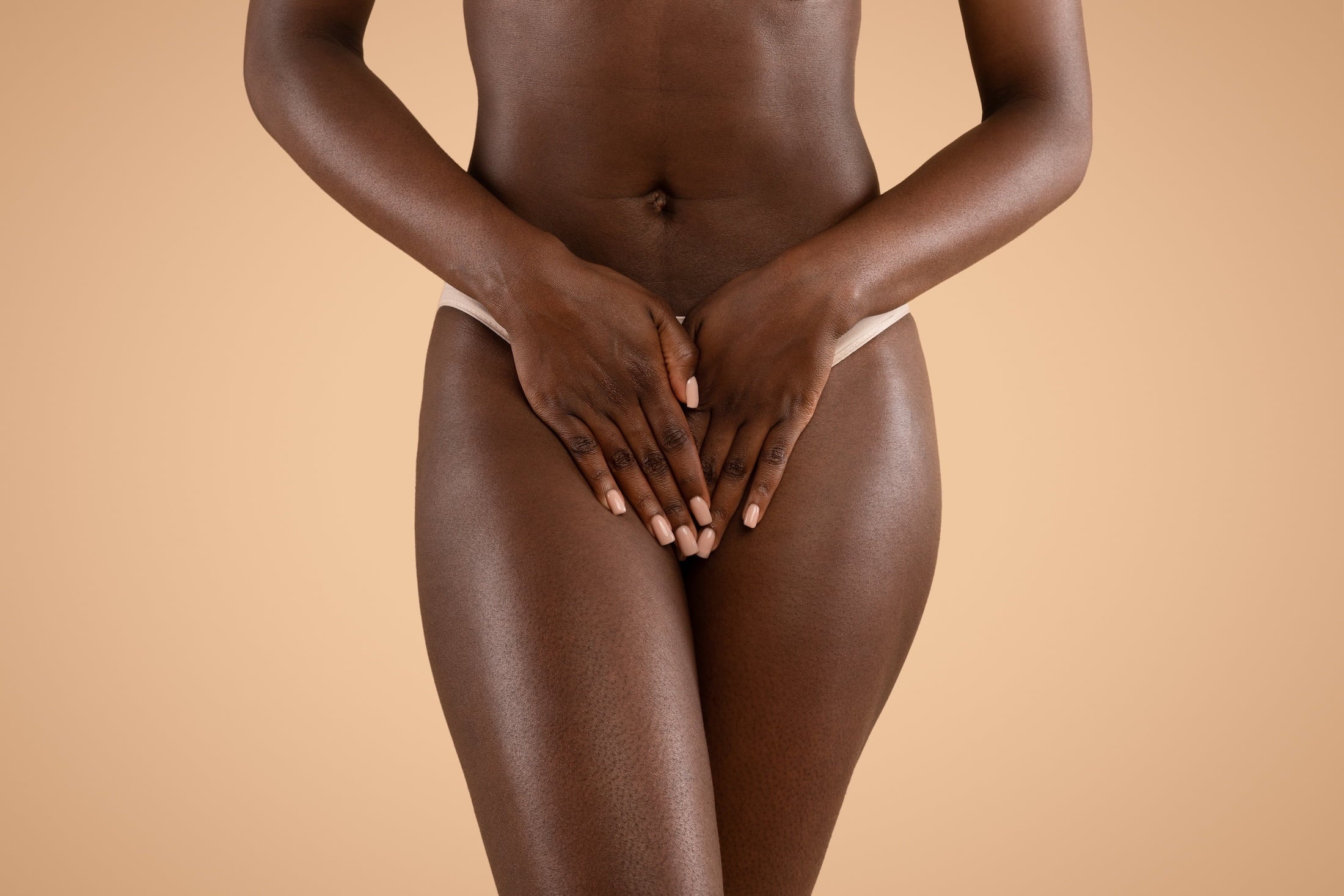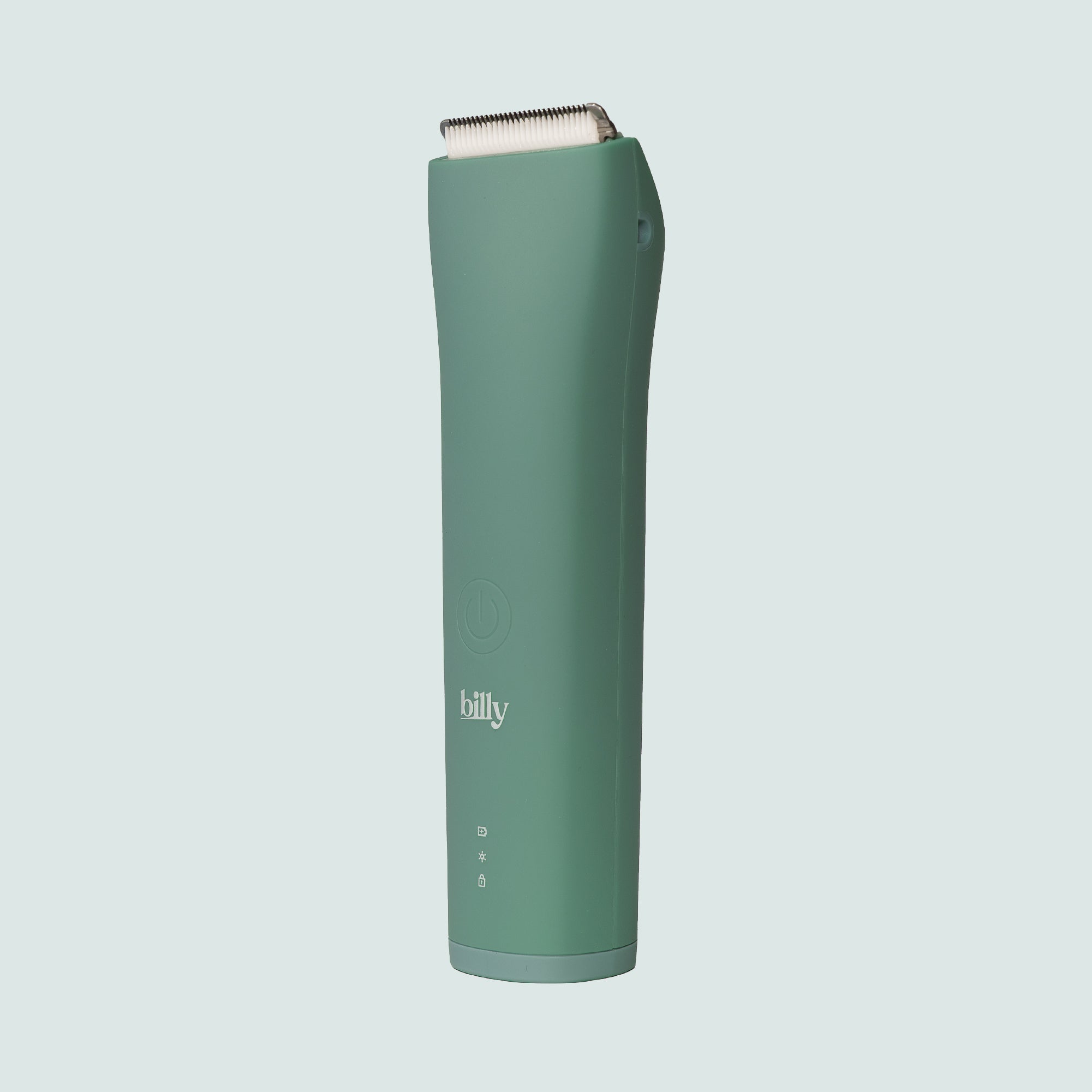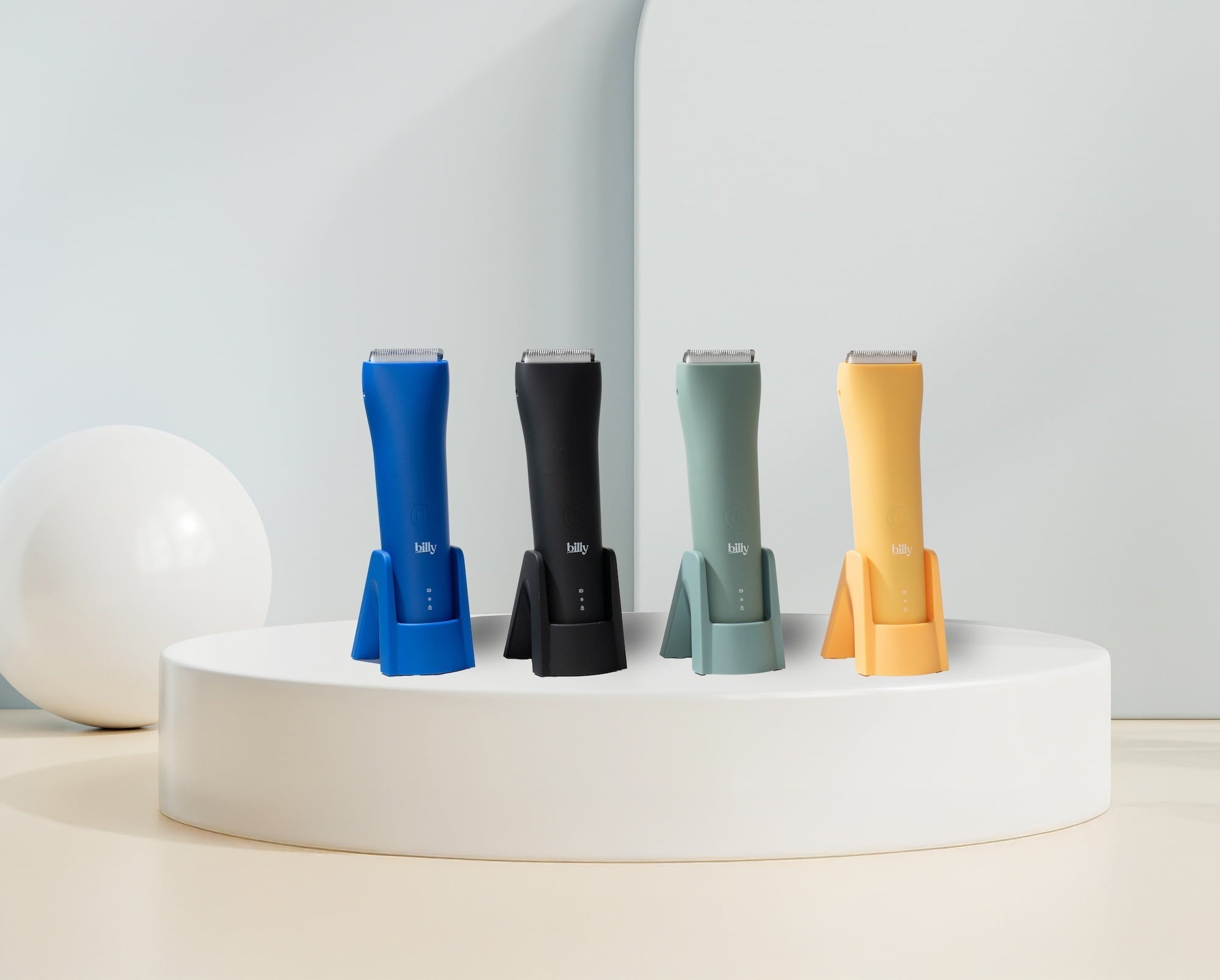We’re going to talk about a topic that truly concerns everyone: ingrown pubic hairs. Those small red bumps that appear in the intimate area can really disrupt your daily life. In 2025, it’s time to understand and manage this specific issue!
What Exactly Is an Ingrown Pubic Hair?
Pubic hairs are naturally thicker and often curly, which makes them particularly prone to becoming ingrown. Instead of growing straight out, they turn back under the skin, creating those well-known red and sometimes painful bumps.
The Most Affected Areas
For Women
- The mons pubis (especially after shaving too closely)
- The groin folds (where friction is constant)
- The bikini area (especially with tight underwear)
For Men
- The base of the penis (area of high friction)
- The testicles (very thin and sensitive skin)
- The groin fold (daily friction)
Why Do You Get Ingrown Hairs?
The truth is, our intimate grooming habits are not always the best.Here are the classic mistakes that encourage the appearance of these little inconveniences:
- You shave too closely (we know, it’s tempting, but it’s really not a good idea)
- You use unsuitable equipment (that rusty backup razor—forget about it)
- Your clothes are too tight (let everything breathe!)
- Dead skin cells accumulate on your skin (a little exfoliation from time to time doesn’t hurt)
- Your skin lacks hydration (yes, even there you need to moisturize)
In summary, the most common causes of ingrown hairs are:
- Shaving too close to the skin
- Using unsuitable equipment
- Wearing clothes that are too tight
- Accumulation of dead skin cells
- Insufficiently hydrated skin
Why is the pubic area more affected?
The pubic area is particularly prone to ingrown hairs for several reasons:
- The hair there is naturally thicker and curlier
- The area is warm and humid (a paradise for bacteria)
- There is constant friction
- The skin is more sensitive than elsewhere
- Underwear creates a confined environment
Ingrown Hairs, Prevention: Essential Steps
You know the saying "prevention is better than cure"? This is especially true when it comes to ingrown hairs.Here is how to take care of your intimate area to avoid those little inconveniences.
The Basics for Perfect Skin
Taking care of your skin isn’t just about your face! Your intimate area also deserves your full attention:
- A gentle exfoliation 1 to 2 times a week (we said gentle, not a scrub-down!)
- Good hydration every day with a suitable cream
- Clothing that lets your skin breathe (yes, even your favorite ultra-skinny jeans)
- Well-fitted but not too tight underwear – find the right balance
The A.B.C.<|endoftext|>-BA for a Successful Shave
If you really want to use a traditional razor (even though we recommend other options), here are the golden rules to follow:
- Choose a high-quality razor specially designed for intimate areas
- Change your
blade blade - Always follow the direction of hair growth (resist the temptation to go against it)
- Don’t aim for an ultra-close shave at all costs
- Always use a suitable shaving gel or cream (water alone is a no-go)
Pro tip: A
For Skin Care
- Gently exfoliate the area 1 to 2 times per week
- Moisturize daily with non-comedogenic products
- Choose clothing that lets your skin breathe
- Avoid underwear that is too tight
For Shaving
- Use a suitable and sharp razor
- Change your
blade - Always shave in the direction of hair growth
- Avoid shaving too close to the skin
- Apply a suitable shaving gel or cream
Natural Solutions
Proven Natural Remedies
Already dealing with an ingrown hair? Don’t worry, nature has more than one trick up its sleeve.Here are some gentle solutions that can really help:
- Warm compresses: a bit like a mini spa for your skin
- Green clay mask: your detox ally
- Essential oils: use sparingly and well diluted (we’re not here to turn your intimate area into potpourri)
- Diluted hydrogen peroxide: apply locally and gently
Daily Care
To speed up healing, a few simple steps can make a difference:
- Regular hydration (your skin will thank you)
- Very gentle exfoliation (emphasis on "gentle")
- Well-chosen plant oils
- Alcohol-free soothing lotions
If it gets serious, when to consult?
It is important to consult a healthcare professional if:
- Inflammation persists for more than 48 hours
- The area becomes very painful
- Signs of infection appear
- Ingrown hairs are recurring
Medical Treatments
Well, we're telling you this just for your information, but above all, if needed, ask your pharmacist or your doctor what you should do. They are there for that, so don't be afraid (and don't let a bit of embarrassment stop you, they've seen and heard much worse ;) )
Over-the-Counter Treatments
- Special soothing creams
- AHA lotions (it stings a little but it works)
- Glycolic acid products
- Gentle antiseptics
See a Doctor If:
- It has been painful for more than 48 hours
- The area is very red and swollen
- You have a fever
- It keeps coming back despite your efforts
- Or if you have the slightest doubt that something abnormal is happening
For your information, here are the types of treatments available:
Over-the-Counter Treatments
- Specific soothing creams
- AHA lotions
- Glycolic acid products
- Gentle antiseptic solutions
Prescription Treatments
- Cortisone creams
- Retinoid creams
- Antibiotics if infection is present
- Specific dermatological care
When an ingrown hair becomes more than just a minor inconvenience
Even though most ingrown hairs resolve on their own, some can develop into more serious complications:
Folliculitis: An infection of the hair follicle that appears as small red bumps, sometimes with pus.More common in warm and humid areas such as the pubic region.
Pilous cysts: An ingrown hair can sometimes form a cyst under the skin. It is a small fluid-filled sac that can become painful, especially in sensitive areas.
Abscesses: In the most severe cases, an infection can develop and form an abscess. This is rare, but when it happens, it’s really unpleasant. If you notice a painful, hot, and swollen lump, don’t wait to consult a healthcare professional.
Scarring: By scratching or trying to extract ingrown hairs yourself (we all know it’s tempting), you risk creating permanent scars. Not ideal for such an intimate area!
Hyperpigmentation: Repeated inflammation can leave darker marks on the skin, particularly visible on medium to dark skin tones.
Which method should you choose to avoid ingrown hairs?
Not all intimate grooming methods are equal when it comes to ingrown hairs. Here’s what you need to know to make the right choice:
Waxing: It pulls the hair out from the root, which may seem effective, but beware – the aftermath is often painful! Regrowth can easily become ingrown, especially in areas where the skin is thin, like the groin.
Manual razor: The classic choice, but also the champion of ingrown hairs. Shaving too close to the skin is the number one enemy of smooth regrowth. If you really want to use it, remember to shave in the direction of hair growth and use a good gel.
Depilatory creams: They dissolve the hair at the skin’s surface. Effective, but sometimes irritating for sensitive areas.<|assistantThe regrowth is less likely to become ingrown compared to a razor, but the risk still exists.
The classic
The special intimate area
The trimmer Billy
The best prevention is to adapt your intimate grooming method. When we created the
How does it work? It’s simple: as mentioned above, ingrown hairs often result from shaving too close to the skin. The shaved hair ends up beneath the skin and can get trapped as it grows back—resulting in an ingrown hair. That’s why we designed a
In Conclusion
Ingrown hairs in the pubic area are not inevitable. With proper care and a suitable preventive approach, it’s possible to effectively avoid them.If they appear, there are many solutions available to treat them quickly and avoid complications, and don’t worry, it’s happened to everyone before ;)
Ingrown Hair FAQ
Can ingrown hairs in the pubic area go away on their own?
Yes, most ingrown hairs resolve on their own within a few days if you avoid further irritating the area. But why suffer when you can prevent them?
Can you use the same treatments for ingrown hairs on the pubic area as you do for those on your legs?
Not really. The skin in the pubic area is much more sensitive and delicate. What works on your legs could make you see stars (and not in a good way) if you use it on your intimate areas. Always choose products specifically formulated for sensitive areas.
Do men and women have the same risk of ingrown hairs in the intimate area?
Both are affected, but men often have thicker and curlier hair, which increases the risk. However, women generally use more radical hair removal methods (waxing, full hair removal), which balances the statistics.
Do cotton underwear really reduce the risk of ingrown hairs?
Absolutely! Cotton allows the skin to breathe and reduces moisture that promotes ingrown hairs. In 2025, with all the technical fabrics available, choose natural and breathable materials for your everyday underwear.
Does regrowth after using a
That's exactly the idea! The
Should you avoid shaving intimate areas during pregnancy?
Absolutely! During pregnancy, your skin is even more sensitive and prone to irritation. If you really want to maintain the area, choose a
How can you avoid itching after trimming your intimate areas?
Post-shave itching is often caused by micro-
Can trimming between the buttocks cause ingrown hairs?
This delicate area is particularly prone to ingrown hairs due to constant friction.Here is the English translation, maintaining the professional e-commerce tone and keeping all HTML elements intact:
C'est exactement pour ces endroits compliqués que la
Comment se raser les testicules sans risquer les poils incarnés ?
How can you shave your testicles without risking ingrown hairs?
Les testicules, avec leur peau fine et plissée, sont un vrai défi ! L'astuce principale est d'utiliser une
The testicles, with their thin and wrinkled skin, are a real challenge! The main tip is to use a specific
Les poils incarnés peuvent-ils apparaître même après avoir utilisé une
Can ingrown hairs still appear even after using a
C'est beaucoup moins probable qu'avec un rasoir, mais ça peut arriver si le réglage est trop court.
It’s much less likely than with a razor, but it can happen if the setting is too short.The advantage of
Are chemical exfoliants (AHA/BHA) really safe for the pubic area?
Let’s be honest: what works for your face isn’t necessarily suitable for your intimate areas! Chemical exfoliants can be effective against ingrown hairs, but they should be used sparingly and at low concentrations on these sensitive zones. And always, always test on a small area first. If you feel excessive tingling or burning, rinse immediately!
Can you use the
Absolutely! The
Can ingrown hairs cause sexually transmitted infections?
No, ingrown hairs themselves do not cause STIs. However, be careful: micro-lesions caused by ingrown hairs can create entry points for infections during sexual activity. Another reason to take care of your intimate area with suitable equipment like the
How do you care for your intimate area as a beginner?
Start with the
Are there any essential oils that are truly effective against ingrown pubic hairs?
Certain oils such as tea tree, lavender, or tea tree oil have anti-inflammatory and antibacterial properties that can help. But be careful: ALWAYS dilute them (1-2 drops in a teaspoon of carrier oil) before applying to this ultra-sensitive area. And if you feel any tingling, rinse thoroughly. Honestly, for intimate areas, we recommend gentler solutions!






















Share on your social networks: